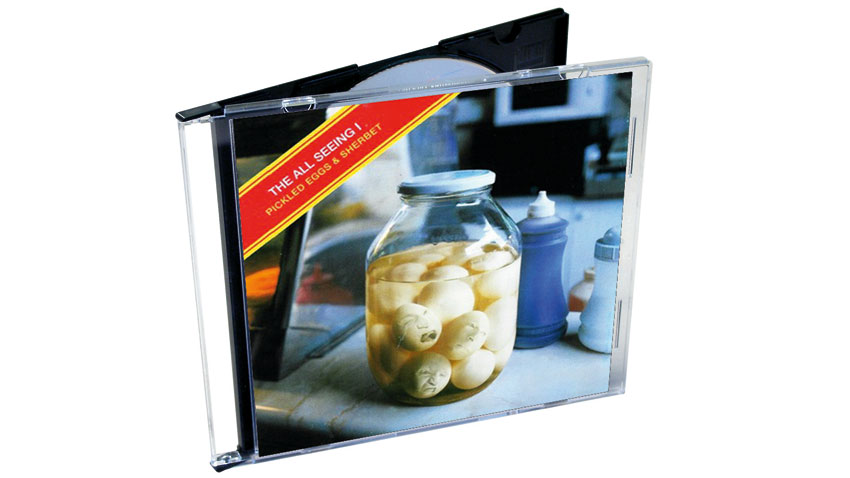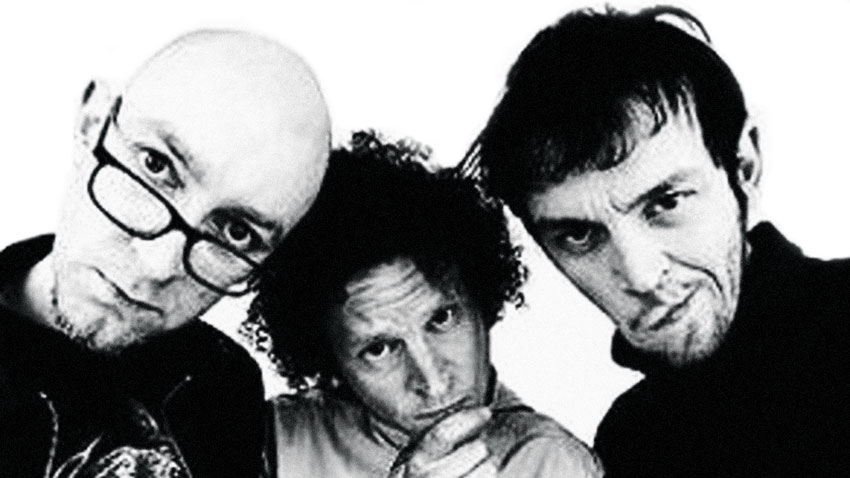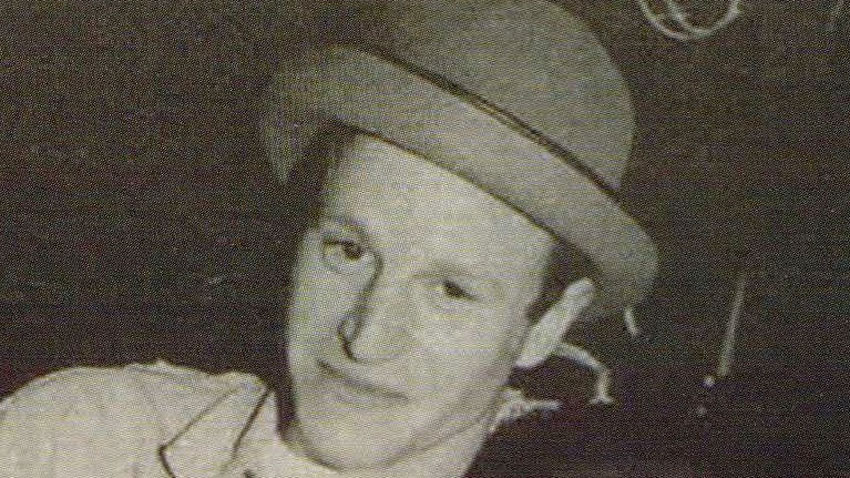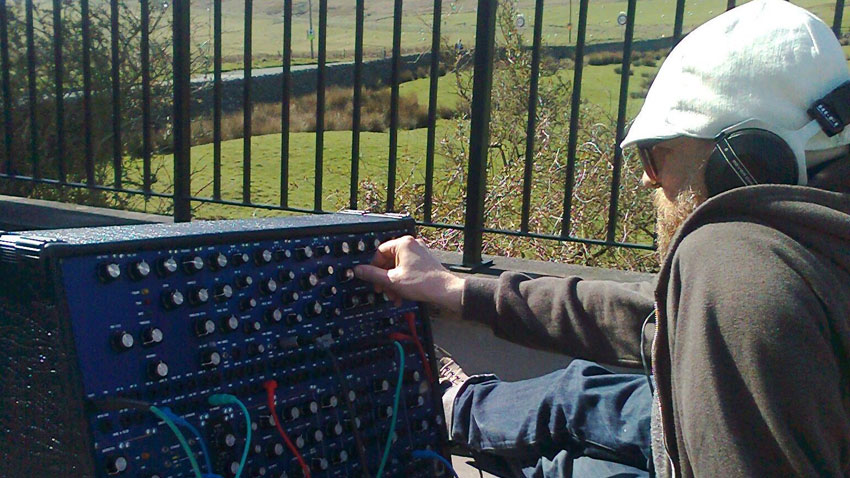Classic album: The All Seeing I on Pickled Eggs & Sherbet
The beat goes on

The people of Sheffield have always marched to the beat of their own drum - a drum often played by a one-armed man (yes, Def Leppard). It's the home to bleep factory, Warp, as well as comedy Yamaha-tinkler, John Shuttleworth. And over the years the weird and wonderful music emanating from the area has challenged the very notions of what it means to go 'pop'.
Which brings us to the curious case of The All Seeing I. Comprising programming whiz Dean Honer, musician Jason Buckle and all-round vibes controller DJ Parrot, this outfit were responsible for some of the most Steel City beats of their generation. Over the course of their only album, Pickled Eggs & Sherbet (1999), they brought together Industrial and Dancehall (I Walk), Big Band Swing (Beat Goes On), and Cuckolded Vegas Turbo Lounge (Walk Like A Panther). It was as daft as a brush and as infectious as lice.
"I think it just was what it was," shrugs The All Seeing Dean Honer. "It was lo-fi, homemade bedroom production, mixed with the various influences that we brought to it. We had some Sheffield electronics in there, some working men's club cabaret, all mixed with the lyrical wizardry of Jarvis Cocker."
Ah yes, the Britpop anachronism penned many lines. As a city native he knew the tone of The I from the off, dropping grubby lyrics about suspect stains on a cheating wife's clothes that sounded great when sung by (why not?) faded 70s crooner and South Yorkshire expat, Tony Christie.
Add to the mix the band's missuses on backing vocals, The Human League's Phil Oakey popping up at one point, and the bonkers samples and cheap electronics at the core, and you have an album that is in turns odd, amazing, old, new, funny, fearless, and somehow, effortless.
"I thought we were making pop music in our own upside-down way," says Jason Buckle. "It didn't then, and still doesn't, sound like anything else. We were one of the last of the 'sample 'n' get away with it' type bands. I just can't believe that we got such odd sounding things in the charts and on Top of the Pops!"
Here, the band take us track by track through their madcap, enigmatic long player…
Get the MusicRadar Newsletter
Want all the hottest music and gear news, reviews, deals, features and more, direct to your inbox? Sign up here.

Walk like a Panther (featuring Tony Christie)
DJ Parrot: "The Beat Goes On was an unexpected hit, so we wanted a follow-up, but didn't want to do another sample track. The idea was hatched to dig up Tony Christie - this is years before Peter Kay and the re-issue of Amarillo. He lived in Spain and was quite hard to find.
"We thought he deserved some good words, so collared Jarvis Cocker when we were all on Top of the Pops together. When Tony got the demo, he wasn't very impressed. Luckily, his son persuaded him to have a go at it.
"I remember recording his vocal at a big posh studio in London, and the backing track being in the wrong key. Dean [Honer] had to stretch it for him and it sounded fucking terrible. Given his misgivings, Tony did well to sing anything at all on that. However, when we got back to the bedroom studio and replaced the loop, it shaped up very quickly. As I remember, most of the drum sounds were crunched samples out of Jason's [Buckle] little Casio SK-1. He also put on the guitar part that quite possibly got it into the Top 10!"
Dean Honer: "Jason's guitar riff made this. I thought Tony's vocal was great, too. Loved his harmony on the chorus - really lifts it up. We used samples from a Sequential Circuits DrumTraks for the rhythm. I can also hear a sick - as in poorly - sounding [Korg] MS-20 riff come in on the second verse. The chorus whistle was from the Yamaha TX81Z."
No Return
DJP: "This was written on exactly the same loop as Walk like a Panther - we liked the Jamaican style of re-using backing tracks.
"The singer and co-writer, Lisa Millet, was recommended by our manager, Dennis. She came up, sat on Dean's settee and sang the song, one take. I'm not sure she even had headphones on."
DH: "Lisa has a beautiful voice. She sang live with us. I distinctly remember her doing a big gig with us somewhere and singing the hard version of I Walk live - it was a proper 'wow' moment. She was electrifying when she went for it."
Beat Goes On
Jason Buckle: "We got a lot of remix work and I'm sure everyone wanted 'The Beat Goes On Part 2' for their track, but they never got it."
DH: "The single version came together really quickly. I remember putting the buzzy [Sequential Circuits] Pro One sound in and some 'Radiophonic' blips. I think we filtered the sample with the [Akai] S3000 filter."
DJP: "The single version of this had a large sample of a Buddy Rich recording belonging to Blue Note, and they really hung us out to dry. So, on the LP, we took those parts out and brought the rhythm track to the fore."
Sweet Music
DJP: "The record company wanted us to tour and Dean knew a singer/guitarist called Boz who was up for performing live. We thought he should feature on the record as well, so we cobbled this together."
DH: "It's probably the closest thing to a proper house-y disco track featuring the mighty Boz! Not my fave song, but it was over seven minutes so it used up a bit of time… I think Jason and I used to pull a face at this one [laughs]."

Mary
DJP: "The singer is a lovely lady from Hawaii called Tiana Krahn, she also did the vocals on The Beat Goes On. She takes the lead here, pointing out the many failures of men over a grunky old drumbox loop."
DH: "This one sounds good. It's probably a loop distorted and fucked up in the S3000. We first met Tiana when she roller-skated into the record company office. I worked with her recently on an I Monster track. She's living in California, printing books."
JB: "This track has 'biscuit tin drums', which are always nice. This one is a good example of all three of our music minds here, I think."
1st Man In Space (featuring Philip Oakey)
DH: "It was great meeting and working with the legend that is [The Human League's] Philip Oakey. This one always worked better live. The addition of real drums, played by Ross Orton, really gave it some energy and dynamics."
DJP: "This song was written for Tony. He'd sung Panther and Stars On Sunday and we were really into making him into the voice of the band, like this fucked up lo-fi Electro 'chicken-in-a-basket' thing. Unfortunately, our A&R man had a massive effing and blinding row with him, which made things a little strained for a while. We decided that Phil would be a more than adequate replacement. The song's good, Phil's good, but it's the production that's letting the side down.
"The chaotic playfulness of our best stuff seems strangely absent… maybe by the fourth single the fun had gone and things had turned into a grind. Damn."
Drive Safely Darlin'
DJP: "Another song written for Tony Christie. Mr [Jarvis] Cocker ended up voicing it himself. I remember laughing out loud when a reviewer accused us of ripping off George Michael's Faith… The inspiration was actually more clockwork dancehall meets back-to-front Bo Diddley. With Jarvis panting on top."
JB: "Acoustic ragga - got to be a first?"
DH: "We put an acoustic guitar through the Zoom 1201 ring mod here, I think."
"Not my fave song, but it was over seven minutes so it used up a bit of time… I think Jason and I used to pull a face at this one."
Stars on Sunday
DJP: "Tony recorded this at the same session as Panther - and great lyrics from Jarvis, again. Very pertinent to anybody who witnessed Sheffield's decline from a major steel producer into a place that doesn't quite know what it does anymore."
DH: "This still sounds lovely. Nice production for us! I think it has a friend of Parrot's playing the clarinet. It's one of the standout tracks. The whistle is from the TX81Z, and sounds like [Japanese Electronics pioneer] Tomita!"
Big Pecker
DH: "Sounds like a Parrot beat. Definitely an MS-20 bass."
DJP: "Mr Oizo obviously had an MS-20 as well, because this sounds a bit like Flat Beat."

I Walk
DJP: "This was the first single, written around a bit of Tata Vega singing acapella. One side featured this version, kind of industrial dancehall, and the other a mellower easy listening take. Unfortunately, the mellow version had a large and quite naughty sample in it, which made an official release a little prohibitive…"
I Pejulater
DJP: "I have no memory of making this! Quite like it, though. I suspect Dean was messing around with synths one day and it popped out [laughs]."
DH: "Sounds like a Pro One sequence, and some drum machine stuff going through the Zoom. Nice!"
Nicola
DJP: "After Panther made the Top 10, Tony was willing to let bygones be bygones, and was very keen to sing this lyric from Jarvis. He was so enthused that he put considerably more effort into it than the previous songs - you can hear it in his voice."
DH: "Great vocal. I think we recorded it in London - through a posh mic! - then added daft squeaky MS-20 synth noises, pitch modulated by the envelope. The bassline was a bass guitar played through the Zoom ring mod. Backing vocals by Birds-I, our girlfriends at the time, including my now wife!"
Plastic Diamond
DJP: "Walk Like A Panther, No Return, this and Nicola share the same rhythm track. We sort of knew Steve Jones [from Babybird] from his time working in FON Studio, and sent him the music to see what he came up with. This was a couple of years after You're Gorgeous had been a mammoth hit, and I always presumed the lyric on Plastic Diamond was about how much Stephen struggled with and resented being defined by one song."
"This is deffo something started in Jase's bedroom, this. I think I tried to get him to put a full vocal on it, but he wasn't having it."
Dirty Girl
DJP: "This is deffo something started in Jase's bedroom, this. I think I tried to get him to put a full vocal on it, but he wasn't having it [laughs]!"
JB: "This was a straight lift from one of my grubby four-track recordings. Good riff, though. It's also my one and only bit of singing! Sounds like Dean's Pro One adding some bass, and an MS-20 doing a little line on top - the rougher and smellier the better, we thought."
Airy Armpits
DJP: "Who knows what we were going on about here? [Laughs]. The title seems to reference [French coffee table beatmakers] Air - haven't a clue why, though."
JB: "It sounds like one of the ones that lulled me to sleep."
DH: "Yeah - sounds like a sleepy jam, with plenty of the Zoom on it. Perfect to end the album on."


Future Music is the number one magazine for today's producers. Packed with technique and technology we'll help you make great new music. All-access artist interviews, in-depth gear reviews, essential production tutorials and much more. Every marvellous monthly edition features reliable reviews of the latest and greatest hardware and software technology and techniques, unparalleled advice, in-depth interviews, sensational free samples and so much more to improve the experience and outcome of your music-making.
"At first the tension was unbelievable. Johnny was really cold, Dee Dee was OK but Joey was a sweetheart": The story of the Ramones' recording of Baby I Love You
"Reggae is more freeform than the blues. But more important, reggae is for everyone": Bob Marley and the Wailers' Catch a Fire, track-by-track










